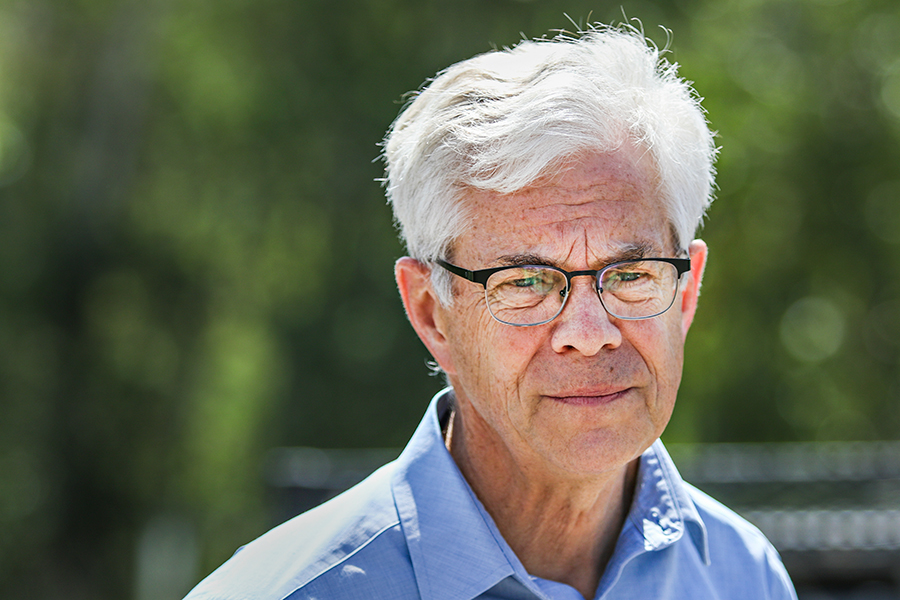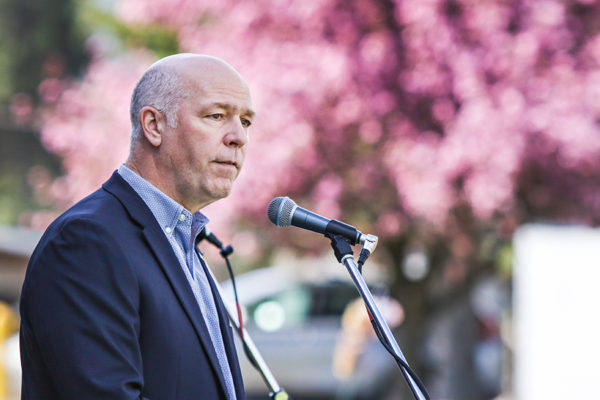The Race to Govern Montana
Lt. Gov. Mike Cooney, a Democrat, and Rep. Greg Gianforte, a Republican, have contrasting visions for Montana’s future
By Tristan Scott
Montana Republicans are seeking to end 16 consecutive years with a Democrat in the governor’s mansion when current Gov. Steve Bullock completes his second term, and believe that Congressman Greg Gianforte is the answer to their prayers.
But Democrats have staked their vision of Montana’s future in Mike Cooney, the lieutenant governor whose career in public service dates back to 1977, when he was first elected to the state legislature.
For Gianforte, 59, a former technology entrepreneur who was first elected to Montana’s lone House seat in 2017, the full-throttle gubernatorial campaign marks his second run for governor after having lost to Bullock in 2016.

It’s also the second attempt at the governor’s mansion for Cooney, 66, a Butte native who ran unsuccessfully for the governor’s office in 2000.
Both men describe very different approaches to how they would govern the state.
One of the wealthiest members of Congress, Gianforte touts his business acumen, which includes founding a start-up technology company in his hometown of Bozeman that was eventually sold for almost $2 billion. Gianforte has vowed to “get government out of the way” and make immediate changes to leadership in Montana’s regulatory government agencies, including the Department of Environmental Quality (DEQ) and Montana Fish, Wildlife and Parks (FWP).
Cooney, in contrast, says those agencies are working hard, both to promote sustainable natural resources and manage public lands and critical wildlife species.
Indeed, this summer has shown that Montana’s public lands, both those administered by the federal government and state agencies like FWP and the Department of Natural Resources and Conservation (DNRC), are in high demand.
“I was given a pretty darn good Montana, and I want to make sure we hand off an even better Montana to future generations,” he said.
Part of Gianforte’s economic plan includes support for resource extraction and reducing government red tape, calling the state’s DEQ and DNRC “the project prevention departments.”
Cooney said he would focus on clean energy alongside oil, gas, and coal, and said sustainable resource extraction can coincide with the state’s growing outdoor recreation and tourism economy.
“We need to take advantage of the great clean energy capacity that we have,” he said. “That’s where the market is heading.”
He said he has no plans to dismantle state land management agencies.
Indeed, much of Cooney’s case for the governor’s office mirrors the priorities that Bullock established, including continuing Medicaid expansion, investing in veteran mental health and education, and establishing statewide pre-K education.
The two candidates have traded barbs at recent debates, which highlighted their deep contrasts on the COVID-19 pandemic, education funding and concealed carry permits in Montana.
The candidates were split on the degree to which government-imposed restrictions should be employed to curb the spread of the coronavirus, with Gianforte saying that, if elected, he would promote personal responsibility as a tool over health mandates, even as local health agencies complain that individuals aren’t taking their role in the public health crisis seriously enough.
Even though a statewide mask mandate has been in place since July, COVID-19 cases continue to spike at record-breaking rates. Meanwhile, the mask mandate has prompted protests across the state while creating politically charged divisions that defy the pleas of health experts.
Cooney said the state’s response to the pandemic has relied on “science and the best medical practices” and should continue to do so, and described himself as the kind of leader who can unify the widening divisions and promote best practices.
The candidates also disagreed sharply on the state of Montana’s economy, with Cooney championing the state’s unemployment rate, which is one of the lowest in the nation, while Gianforte panned the state’s volubility by emphasizing national rankings that place it as the lowest in the nation in pre-pandemic wages. Returning to a common refrain in his campaign, Gianforte said he would rely on his business experience to help create higher-paying jobs.
On the subject of taxes, the candidates both said they would not support a sales tax. But while Gianforte said he would cut the state’s property and income taxes, Cooney said he would support raising taxes for the state’s wealthiest residents, including Montanans like Gianforte and those in his orbit.
According to Cooney, it’s a lopsided system that requires low-wage earners pay the same tax rate as those making a half-million dollars annually, and the contrast in the candidates’ views on tax policy mirrors the debate taking place on the national stage.
Gianforte also seized on Cooney’s career in public service to draw out contrasts with his business experience, calling the lieutenant governor an “out-of-touch career politician.” Cooney said he’s proud of his four decades of public service — a career he says has prepared him to lead the state and improve upon the success of programs like Medicaid expansion.
Gianforte said he would protect Medicaid coverage for Montanans but supports repealing the Affordable Care Act, which he said has eroded the health of the market and made health care unaffordable in the state.
The governor’s race has so far been one of the most expensive on record for the state, with Gianforte funneling millions from his personal accounts into his campaign coffers, and Cooney drawing in millions in outside spending.
Gianforte gained national recognition after he assaulted a reporter and lied to authorities on the eve of a special election for Congress in 2017, though he still won the race. Since then, he’s allied himself to the Trump administration, repeatedly referencing his relationship to the president at campaign rallies.
Gianforte’s name recognition may weigh in his favor — while Cooney hopes voters want him to build on Bullock’s legacy.